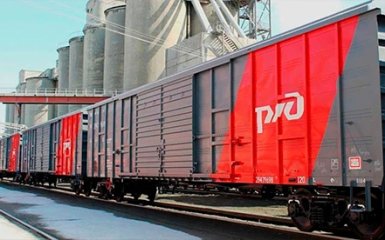Due to attacks by Iran-backed Yemeni Houthis on merchant ships in the Red Sea, the demand for the transportation of goods from Asia to Europe by the Russian Railways has increased sharply.
How Russia profits from the crisis in the Red Sea
It is noted that the increase in the transit of goods from China to Europe by Russian railways due to Houthi attacks on ships in the Red Sea contributed to the increase in the income of the railway monopolist of the aggressor country.
Thus, according to representatives of the German company DHL, the transportation of goods by Russian railways increased by 40% after container ships began to be redirected along a longer route in December.
RailGate Europe notes that demand has increased by 25-35%.
The Dutch Rail Bridge Cargo reported that freight rail transportation through Russia increased by 31% this year.
Logistics companies have taken a fresh look at routes through Russia after the decision of most major container shipping lines to reroute flights from Asia to Europe, which normally go through the Suez Canal, via the Cape of Good Hope. This decision was taken after Iran-backed Yemeni Houthi rebels launched a campaign of attacks on commercial vessels in support of the Palestinians in Gaza, the publication said.
It is noted that such transit increased the time of delivery of goods from China to Northern Europe from 7-10 days to 50-55 days.
At the same time, DHL representatives state that the delivery time by rail through Russia between Chengdu in China and Duisburg in Germany is 25 to 30 days.
Logistics companies including Switzerland's Kuehne & Nagel and Denmark's Maersk have said they are avoiding using rail routes through Russia following Russia's full-scale invasion of Ukraine.
The authors of the material note that RZD, which manages most of the trains, belongs to the state and has long been considered closely connected to the Kremlin.
Meanwhile, EU sanctions provide for an almost complete ban on road freight transportation to and from Russia and Belarus.
There are also restrictions on Russian Railways' access to some financial services. However, there is no ban on the movement of goods by rail across the country.
Michael Aldwell, head of maritime logistics at Kuehne & Nagel, said that in the current environment there is "more demand" to transport goods from Asia to Europe by rail.
However, he emphasized that the company has "completely" ceased operations on this route from 2022.
Most cargo from Asia to Europe is transported by rail along what DHL calls the "Western Corridor," through Kazakhstan to Russia and on to Belarus. Some cargoes follow the "Northern Corridor", crossing the border directly from China to Russia east of Mongolia
Some logistics companies offer a "southern route" that bypasses Russia and passes through Kazakhstan, Azerbaijan and Turkey. But it takes longer than a container flight between China and Europe.
In September, Maersk began offering customers the option of shipping goods by sea to the Georgian port of Poti and then on to Central Asia via the southern route.
RailGate Europe stated that they have no business with the RZD. Instead, transportation was booked through such operators as Germany's Deutsche Bahn. The latter confirmed that it currently acts only as a "tourist agent" for cargo going through Russia. At the same time, Rail Bridge Cargo said that its goods are "mostly" transported by RZD. RZD, which is owned by the Russian state, maintains a near-monopoly on train transportation in Russia's vast railway network. This means that the Russian Railways pays both for the transportation of goods through Russia and for access to its network, the authors of the publication emphasize.
More on the topic
- Category
- World
- Publication date
- Додати до обраного


